When I reviewed Daphne du Maurier’s novel Rebecca, I was under the assumption that most of my readers had read it and thus included spoilers. Turns out, I was wrong! Anne of Green Gables (1908) by L.M. Montgomery is the beloved classic that has sold over 50 million copies world wide. Despite it’s success, I’ve decided to not include any spoilers — I’ve learned from my mistake! I want to add that I’ve seen the made-for-TV miniseries of this book many times; therefore, I knew the plot.
Green Gables is a farmstead located in Avonlea on Prince Edward Island in Canada. Marilla and Matthew Cuthbert are a brother and sister (a fact not blatantly stated until the very end) who never married or had children of their own, and thus they live together. They’re getting old, though — Matthew is 60 and has a bad heart — so they tell a friend who tells a relative who is going to an orphanage to pass along the message that the Cuthbert’s want to adopt a boy of about 11 to help on their farm. Not exactly a realistic way to initiate an adoption!
Terribly shy Matthew sets off in his buggy to pick up the orphan boy at the train station only to find a girl — a redheaded, skinny, freckled, highly-talkative girl! Will Marilla consent to keep her, when they don’t have any use for some girl? Based on the title of the book, you can assume yes, they do, but the delight of the novel is getting to know Anne and her strong personality, and seeing how people react to her.
Much like in the first chapter of Rebecca, there are numerous descriptions of foliage. Should a person not like Rebecca, it’s thanks to all those plants! The novel smooths out, though, and focuses mostly on rhododendrons and azaleas, which were easy enough to Google. But Anne of Green Gables has all the plant life — flowers, trees, and ferns alike — and it gets overwhelming if you’re like me and can name/recognize almost no plants. Thanks to the TV miniseries, I could picture Avonlea, though plant-lovers would rejoice in the words alone.
Many reviewers talk about Anne’s imagination (it’s huge) and her temper (it’s bad). I want to look a bit deeper at this book to give you food for thought. For instance, how we render children culpable unfairly. Notice that when Anne does something foolish, she is humiliated and must repent. Yet, many of the foolish things she does are the result of an adult’s misdoing. Example: Anne bakes a cake for the new minister and his wife, and she wants to do her very best! Despite a little cold, she bakes the cake with all the love she can muster. But it’s a disaster, and the cake tastes awful. Marilla scolds Anne to pieces, but it’s Marilla who filled an old vanilla jar with anodyne liniment (which, according to the National Museum of American History is not used for cake baking). Anne couldn’t smell the difference due to her cold, and label said vanilla! Other such blunders are Marilla’s fault, but Anne is repeatedly described as impractical, flighty, and sometimes bad. In the end, readers laugh at Anne’s mistakes, but the book also got me thinking about the way we treat children.
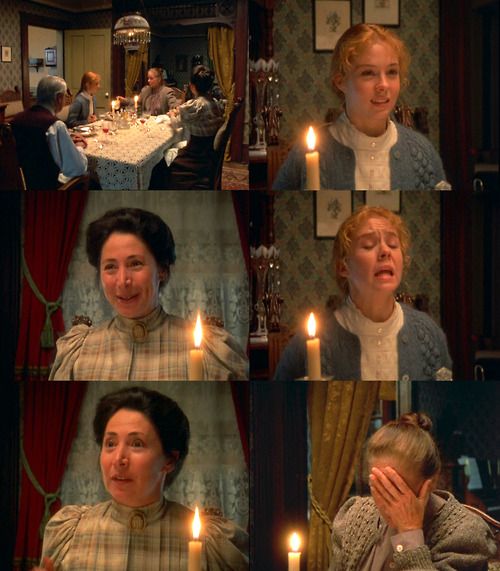
Most everyone befriends Anne and finds her unique and delightful. While we’re told that she has very little formal schooling due to her orphan days, she’s very smart, creative, and uses a large vocabulary. Although I was totally enjoying Anne, I was also wondering if this book hurts the reality of orphans. Is everyone expecting the children they adopt to be the next Anne? I’m sure many children moved from home to home have deep emotional issues, mainly lack of trust and education (moving from home to home prevents regular schooling). It’s a romanticized novel for sure — why is Anne so smart without school or a stable home? — though when you are in the throes of Green Gables, it’s hard to care about reality.
In fact, you really need to let go of reality. Anne is friends with adults and children alike, and she has a “bosom friend,” the best friend ever, with whom she never ever fights or becomes jealous of.
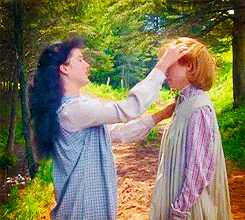
This disastrous 2016 combined with Anne of Green Gables made me on-again/off-again bitter. If only I moved to Canada, I thought, I could be happy and live a simple life. But that’s just silliness on my part. Avonlea (and Prince Edward Island) is so tiny that there is no diversity in Anne’s world. There are no people of color, LGBT characters, or families from anywhere beyond Avonlea (there are disparaging remarks about Arabs, French, people from U.S., Italians, even those from Nova Scotia). If people in Avonlea are fighting, it’s over small things, like whether or not they should say whatever comes to their minds, or be more tactful.
It doesn’t seem like I’ve said much nice about Anne of Green Gables. I think the magic of this book is that it’s escapism at its best, and it’s funny and endearing. I raced through the pages, sometimes letting my eyes go faster than my brain, requiring me to go back and re-read sentences. I was hungry to go faster because the book is so good.
Take for instance the characters. Two main characters are so stern that Anne’s creativity is sure to rile them up. There’s Mrs. Rachel Lynde:
“…for not even a brook could run past Mrs. Rachel Lynde’s door without due regard for decency and decorum; it probably was conscious that Mrs. Rachel was sitting at her window, keeping a sharp eye on everything that passed….”
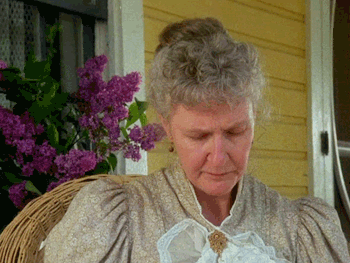
And then there’s Marilla:
“Here sat Marilla Cuthbert, when she sat at all, always slightly distrustful of sunshine, which seemed to her too dancing and irresponsible a thing for a world which was meant to be taken seriously.”

Compare these two stiff women to Anne:
“You’re not eating anything,” said Marilla sharply, eying her as if it were a serious shortcoming.
Anne sighed.
“I can’t. I’m in the depths of despair. Can you eat when you are in the depths of despair?”
“I’ve never been in the depths of despair, so I can’t say,” responded Marilla.
“Weren’t you? Well, did you ever try to imagine you were in the depths of despair?”
“No, I didn’t.”
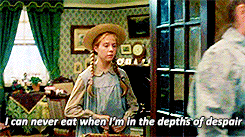
The shenanigans that ensue from the intermingling of these three personalities is worth the read alone! Anne of Green Gables is also very funny. When Anne falls off of a roof after being dared to walk it’s peak, bosom buddy Diana runs up:
“Anne, are you killed?” shrieked Diana, throwing herself on her knees beside her friend. “Oh, Anne, dear Anne, speak just one word to me and tell me if you’re killed.”
As if the dead can tell you they’re dead! Ha!
As Anne grows and matures and does her best in school and at home, she is recognized for her efforts. Mrs. Rachel Lynde says, “You’re a credit to your friends, Anne, that’s what, and we’re all proud of you.” And isn’t that a great feeling? I can’t remember a time in my life when doing good meant I reflected well on my friends. Competition to be the best is a selfish, angry beast, one we’ve cultivated to the extreme. For me, in high school, it was getting 1st chair violin, regardless of how well the orchestra did. In grad school, it was who wrote the best stories and published the most, despite writing not being a competitive activity. Even while blogging, I’m aware that we’re all working to have the most likes and comments and shares. I want to be a credit to my friends and community. And that’s the beauty of Anne of Green Gables. It’s an unrealistic world, but you want to emulate it to be a better person.
My copy is part of an eight-book box set released from Bantam Books in 1998. There is a map of Prince Edward Island and a brief biography of L.M. Montgomery in the back.
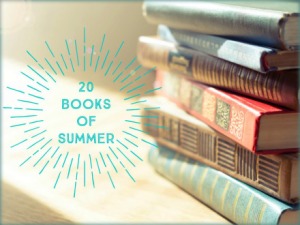
#20BooksofSummer
This book was read as part of Cathy 746′s challenge to read 20 books between June 1st and September 5th.

This book has a special place in my heart – I read it over and over in my childhood and teens and the television series was perfection (again, seen it over and over and Jonathan Crombie [RIP] was exactly what I’d imagined Gilbert to be).
LikeLiked by 1 person
That’s so sad; I didn’t know Crombie passed away, and only last year, too.
LikeLiked by 1 person
Oh dear… Sorry to be the bearer of that sad news.
LikeLike
I love these books so, so much–I could never review them, because I could never read them with a remotely critical eye! I do agree with your comments about how we often blame children unfairly for the miscommunications of adults, something that is very apparent in Anne’s life. I tend to take things extremely literally, so I ran into *many* issues due to this as a child/teenager (er, and sometimes now). Some of my favourite moments in the book come when Marilla unbends and acknowledges her own culpability, and admits that she has things to learn from Anne. Admittedly, this is not very often.
A point on Anne’s friendships with adults, though–I always got on much better with adults than I did with my peers, and because I was part of a small church community, I was able to form healthy friendships with people in their twenties when I was a teenager. Obviously these were not extremely close friendships (that would have been weird), but they were definitely friendships that had a positive impact on my life, and some of them have lasted into my adulthood and become close friendships. I think maybe it’s a part of being in a small, close-knit community–like Avonlea–so that part never stretched my incredulity (although, as I said, I might not be the most critical of readers ;-)).
LikeLiked by 1 person
You sound like an Amelia Bedelia type! 😊 I think you should review the book because you obviously know it inside and out, so you could talk about the minor posts instead of the same major incidences that other always choose to discuss.
LikeLiked by 1 person
I didn’t know who that was (I don’t think we have Amelia Bedelia in the UK) but I googled her, and yes, that sounds about right!
LikeLiked by 1 person
She’s delightful! Although, I couldn’t help finding her terribly stupid when I was a kid…the delightful bit comes from the wordplay I see as an adult, lol.
LikeLiked by 1 person
Hooray! You’ve finally read it! Did it live up to expectations? I haven’t read it for years, but I know I devoured all the sequels even though this is the best one (oops sorry).
LikeLiked by 1 person
I’m reading the second book now, and while it is different because Anne is older, there are aspects I enjoy more. I had an idea of how the first book would go due to seeing the mini series. I enjoyed the narrator who talks to the reader and the romance between Anne and Gilbert being softened to almost nothing compared to the mini series. I like how Gilbert loves patiently instead of pining from afar.
LikeLiked by 1 person
OOOOOOHHHHH, I’m so glad you put up your review. So so so awesome. I’m glad you took a critical look at it, actually. And I can’t wait for the next one 🙂
LikeLiked by 1 person
Thanks, Jupiter! I haven’t seen you around the blogosphere, so I thought you disappeared!
LikeLiked by 1 person
Just really busy with professional development activities and a huge reading slump, but when I saw you’d posted on Anne of Green Gables, I had to jump back on!
LikeLiked by 1 person
You’re too kind! ❤
LikeLike
Soooo glad you enjoyed it! Yes, Anne does get the blame for things that aren’t really her fault – like for setting Diana drunk! But what I love about it is when Marilla unbends and admits it occasionally, and watching her soften towards Anne and the rest of the world as Anne gives her an inkling of what it would have been like to have a home and children of her own. And Matthew! Gotta love Matthew! “That weren’t no boy! That was my girl – my girl that I’m proud of!” *sobs brokenly*
LikeLiked by 1 person
The thing that worries me was that every time Anne messed up, though it wasn’t her fault, someone mentions that the Cuthberts should regret keeping her.
LikeLike
Yep, I’m afraid a lot of orphans were very badly treated – Anne was actually one of the lucky ones. Even decades later, Britain was still shipping orphans off to Australia and such-like to be handed over as free labour (or worse) to anyone willing to take a child in.
LikeLiked by 1 person
How awful…not just the abuse, but the stigma.
LikeLiked by 1 person
I grew up with mostly non-American books, except maybe for some writers for boys, like ES Ellis. My favourites were the (English) William books of Richmal Crompton. But I’ve listened to the Anne of Green Gables books while driving (and I think I remember knowing the Cuthberts were brother and sister from the beginning) and enjoyed them immensely. And I’m not sure I ‘approve’ of children watching the tv series rather than reading the book, but then I’m old fashioned like that.
LikeLiked by 1 person
Perhaps I missed that they were siblings right away, but I knew from the mini series. I think in the U.S. and Canada, the miniseries is one of those films that mothers watch with daughters, who share it with their daughters. I’ve written in other posts about my problems with Anne of Green Gables when I was a girl. She was too difficult for me to read (and I still believe that the books have some challenging vocabulary and wording). Anne also makes a number of literary references to poems most of us only begin to study in high school or college, whereas she is eleven.
LikeLike
I just read Anne of Green Gables for the first time this year, although I grew up watching the miniseries and have seen it many times, and am slowly working my way through reading the series. I’ve only read the first 3 books. I love them so much and am trying to read them slowly.
I love Anne’s imagination and the way LM Montgomery writes. She is so descriptive!
I think somewhere along the line I had a misconception that these books were fluff, and they are not. There is a lot of really great life lessons in the books and Avonlea is such a great setting.
LikeLiked by 1 person
I’m in the last few pages of book two, and it seems both more serious and more unrealistic to me, but I’m only being cynical because I’ve grown that way. A version of me ten years ago would be appalled by me today and my lack of faith in book romance and love.
LikeLiked by 1 person
Your review makes me want to reread the book and also revisit the miniseries. Anne is definitely a romantic character, not the least bit realistic, but I think she taps into that part of us that remembers what it was like to be young, where everything was a big deal. Enjoyed reading your review!
LikeLiked by 1 person
Thank you so much! I actually just watched the first movie in the miniseries the other day. I wanted to watch it while I was reading the book, but I knew that if there were any key differences between the two, I would mix them up in my head before I wrote my review!
LikeLiked by 1 person
[…] my review of Book #1, Anne of Green Gables, […]
LikeLike
So, yes, if you’re interested in *how* Anne turned out the way she did, then you might want to eventually read ‘Before Green Gables’. Of course, you might not find that it answers your questions sufficiently, but it might scratch the itch a little bit. For example, Anne did go to school, because it was law in NS at the time for all children to go. She didn’t go constantly, but when she dd go, she soaked it all up. But, really, I think she just must have had a good genetic make-up that made her smart, resilient, and imaginative. Anne makes me believe that your imagination really can save you.
As for the lack of diversity, etc. – it’s definitely true! And, the disparaging remarks get worse as you read on. And there are a couple of her books that have remarks that are downright horrifying (I can’t remember which ones, but one of them might have been Rainbow Valley). I just remind myself that it was a different time, and that LMM is progressive in many other ways, such as the way she writes about women. And I do love how funny she is. I find her humour especially interesting considering how hard her own life tended to be.
Also, I do think her books can be better appreciated as an adult. So much of it must have gone over my head as a kid. I mostly loved the parts about Anne and Gilbert. 🙂
LikeLiked by 1 person
I’m trying to remember that it’s really in the movies that Gilbert and Anne seem like two lovers who can’t get it together. In the book, it’s mostly the narrator. For instance, at the end of Anne of Avonlea, the NARRATOR says that Gilbert is hoping after four years of college that he’ll be smarter and capture Anne’s heart. They never interact in romantic ways. At the end of the first movie in the miniseries, Gilbert is touching Anne’s face and affectionately calling her “carrots” (which I don’t think LMM’s Anne would tolerate!), and he’s always pining away from the bushes as Anne and Diana laugh together.
Your comment about imagination saving you; that reminded me of the book The Little Princess by Fances Hodgson Burnett, which was about a girl whose imagination and one friend are the only things that get her through!
LikeLiked by 1 person
The Little Princess is as other good story!
And, yes, the movie makes Gilbert seem more pathetic than the books. He plays it pretty cool in the books, even though you always know he is waiting and hoping… Poor Gil.
LikeLiked by 1 person
I’ve been kind of nervous to read your review of Anne! As I’ve said before, it’s one of my childhood favourites. As a kid, I loved hearing about all her adventures and the heightened world she inhabits. I particularly love how melodramatic she is. Can definitely relate there! And I clearly remember the early foliage descriptions! They bored me to tears. I was like: hurry up and get to the action!!! Even though it’s not a perfect book, I’m glad you enjoyed it for the magic and escapism it offers!
LikeLiked by 1 person
I like how she doesn’t fully grow out of such mishaps, just as we don’t. Think of the time she crashed through the roof of an outhouse and had to be cut out.
LikeLiked by 1 person
Tehe!
LikeLiked by 1 person
[…] sure to read my reviews of Book #1 (Anne of Green Gables) and Book #2 (Anne of […]
LikeLike
[…] be sure to read my reviews of Anne of Green Gables (Book #1), Anne of Avonlea (Book #2), and Anne of the Island (Book #3) […]
LikeLike
[…] be sure to first read my reviews of Anne of Green Gables (Book #1), Anne of Avonlea (Book #2), Anne of the Island (Book #3), and Anne of Windy Poplars (Book […]
LikeLike
[…] difficult, but I’d always felt awful, as if I’d let Grandma down. Thus, after starting Anne of Green Gables about a dozen times, I gave up and stuck the box set away. In college, I sold those books for $40 […]
LikeLike
[…] Anne of Green Gables by Lucy Maud Montgomery […]
LikeLike
[…] Anne of Green Gables by Lucy Maud Montgomery […]
LikeLike
[…] Anne of Green Gables by Lucy Maud Montgomery […]
LikeLike
[…] Anne of Green Gables by Lucy Maud Montgomery […]
LikeLike
[…] Anne of Green Gables by Lucy Maud Montgomery […]
LikeLike
[…] you followed along with my #20BooksofSummer challenge, you’ll remember there was a stretch in there — an 8 book stretch! — during which […]
LikeLike
Oh I so enjoyed reading about your experience reading Anne! I have to echo another commenter though – having read these books as a kid, I will never be able to read them critically. Plus they are SO of their time that I’m not sure it’s fair to hold them to modern standards. There are definitely parts that I read now and cringe (and you’re of course completely right about the lack of any diversity) but this was published in 1908. Is there any diversity in Little Women? Jane Eyre?
The orphan thing – Montgomery for sure romanticized taking in an orphan and of course the Cuthberts got really lucky. But I do think it was fairly common to take orphans in to do work on a farm or house. Realistic now? Definitely not. But again, Anne is of a certain time.
LikeLiked by 1 person
I think even in 1908 Anne’s experience would have been unusual. People were taking in kids to work more than love (which is pretty much what everyone tells the Cuthberts). The lack of diversity doesn’t seem surprising to me given that the book is set on a conservative island, but I would need some facts to know for sure. These comments about diversity and reality are not to say that I didn’t not enjoy the books…well, at least all the odd ones + #8 🙂
LikeLike
So I’ve been working on a discussion post about AoGG and you hit some of the points I talk about, so I won’t get into those here.
“This disastrous 2016 combined with Anne of Green Gables made me on-again/off-again bitter. If only I moved to Canada, I thought, I could be happy and live a simple life.”
Right? You said it sister 😅
LikeLiked by 1 person
WE’D BE HAPPY CANADIANS. 🇨🇦
LikeLike
I enjoyed your review! I’m another childhood Anne reader so I am much more sentimental in my reviews of the books rather than critical. But I so appreciate your thoughts! And your fun memes from the TV mini series–one of my favorites.
I believe you’ve heard about the #AnneReadAlong2017 that Jackie and I are hosting. Can I add your review to our list? Let me know 🙂
LikeLiked by 1 person
Hi, Jane! Yes, I heard about it, but I read all of the books LAST summer. I’m happy to have them added to the list, and I’m going to follow along with the readalong.
LikeLiked by 1 person
Cool! We’re excited to have you follow along. I noticed you posted about the full series already. Thanks for letting us link up to your reviews. I look forward to reading more of them!
LikeLiked by 1 person
[…] Review by Melanie @ Grab the Lapels […]
LikeLike
I think back then, adopting some “help” was an extremely realistic way of adopting. Probably one of the only ones, cause adoption wasn’t thought of as a very good thing, and barely anyone probably adopted. People had 5 kids of their most of the time.
Haha, yes – I also googled the plants. And was weirded out to find out that a lot of them grow where I live, which is half a world away. Did not expect that.
Yeah, I also thought the cake incident was awfully unfair to Anne! Couple it with the fact that 11 year olds don’t bake cakes at all today… She didn’t deserve it.
I think at the time Anne was written, it helped the image of orphans rather than give expectations too high. That’s because judging from other books at the time, orphans were thought of as freeloaders and “evil spawn”. Anne proves this to be the complete opposite. Times have changed a lot and now we don’t think this anymore. But I remember even in my grandparents generation (and that’s the 50s) adopting was viewed as “why would you bring it onto yourself” and “they’re going to rob you anyway”, so I see how a book like this could be needed.
And I believe, PEI is different now 😀 I don’t think you’d find it just as untouched. You’d need a time machine for that.
LikeLiked by 1 person
In the books all the neighbors warned Marilla that an orphan would burn her and Matthew “to a crisp in their beds.” I just wonder where these crazy misconceptions came from.
LikeLike
I suppose it’s connected to “taking a child out of bad background”? My grandparents also instantly assume that orphans = expect something bad
LikeLiked by 1 person
I appreciate you linking me to this as well! I’m a little more than halfway through the book, but I already have to completely agree with what you’re saying. It has some problematic issues, and while not to say it’s an excuse, based on the time period it’s not a surprise. I always find the way the treatment of children is portrayed in older media I consume really wild. While adults clearly grasp children have to be raised (or “brought up”), it’s still treated as though they’re mini-adults who should know better? A weird contradiction. Still, it’s a great book for forgetting about life for a while, there is no doubt about that. There is still something that feels so pleasant about it despite its flaws.
LikeLike
Oh, yeah. I later on read Montgomery’s stand alone novel The Blue Castle, and it was just as lovely as her Anne books.
LikeLiked by 1 person
That’s good to hear! I am impressed so far, so I may have to check that one out as well. ^_^
LikeLike
[…] of writing that feels formal compared to The Hate U Give and Dumplin’, reading more like Anne of Green Gables or A Little Princess. For those who say “nothing happens,” I answer that loads happens, […]
LikeLike
[…] Anne of Green Gables by L.M. Montgomery […]
LikeLike
[…] At the Altar: Matrimonial Tales, thinking it would be sappy nonsense for childish dreamers like Anne Shirley. While At the Altar utterly lacks the complexity and depth of adult romantic relationships, I […]
LikeLike